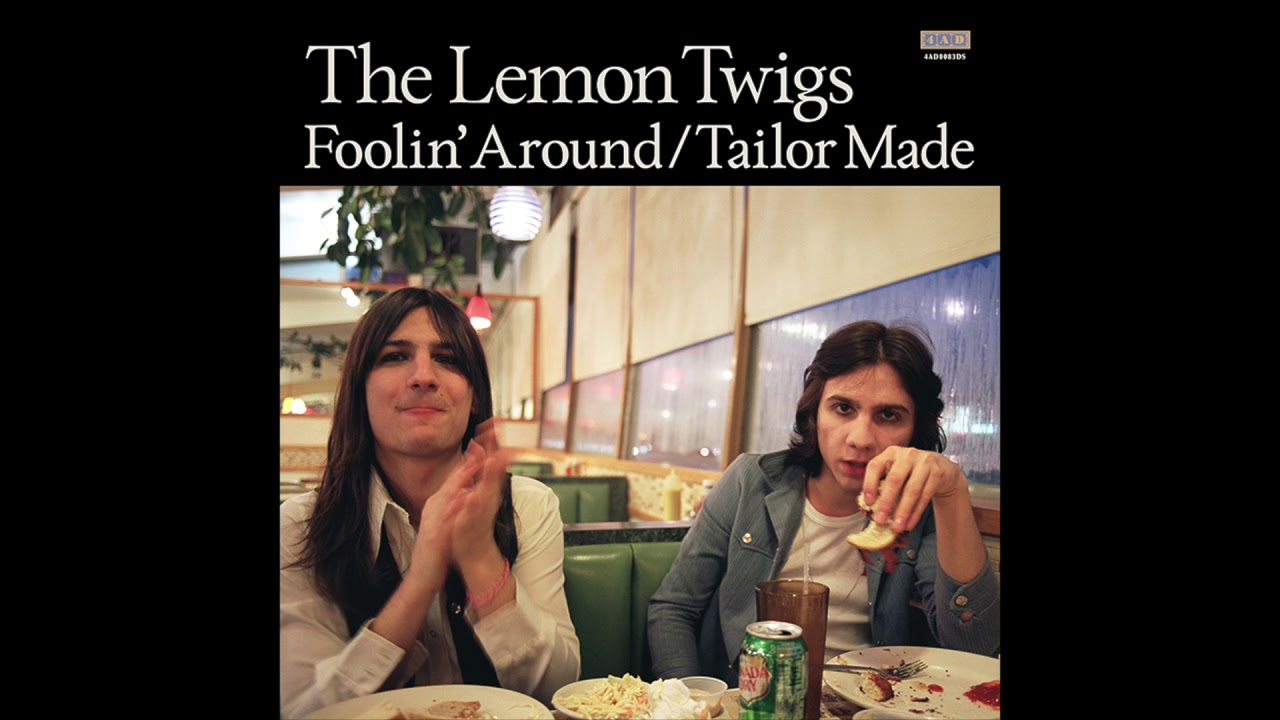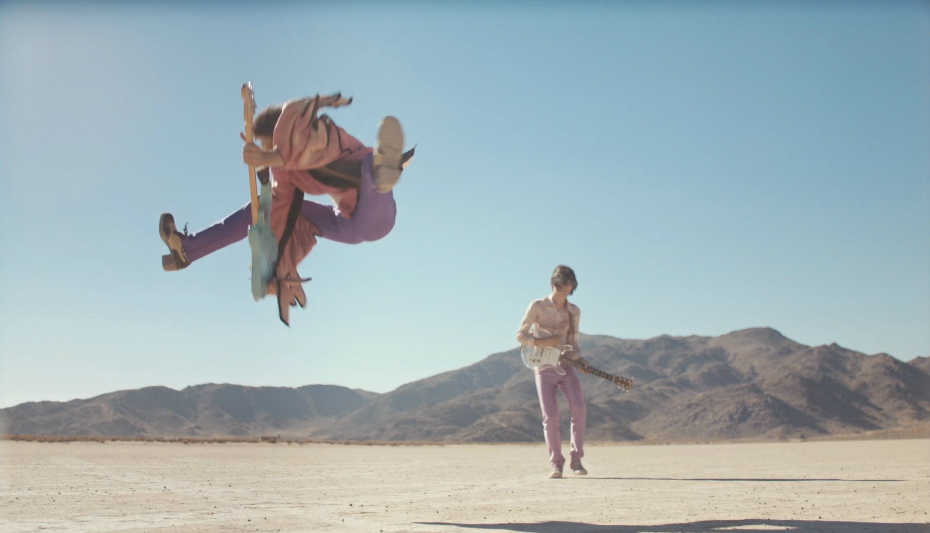Do Hollywood, The Lemon Twigs’ 2016 debut LP, was an invigorating, much-needed blast of fresh air that whipped across the arid landscape of contemporary rock. If that stunningly accomplished recording, which flew in the face of current musical trends, wasn’t surprising enough on the face of it, the fact that Do Hollywood was the handiwork of two teenagers— brothers Brian and Michael D’Addario—rendered the achievement utterly mind-boggling. Now, with the follow-up full-length, Go to School (4AD, Aug. 24), the siblings, now 21 and 19, respectively, have set the bar dizzyingly high even by their own lofty standards, and proceed to soar over it into the stratosphere. Listening to this wildly ambitious album is like entering and inhabiting a parallel universe.
Read more
Do Hollywood, The Lemon Twigs’ 2016 debut LP, was an invigorating, much-needed blast of fresh air that whipped across the arid landscape of contemporary rock. If that stunningly accomplished recording, which flew in the face of current musical trends, wasn’t surprising enough on the face of it, the fact that Do Hollywood was the handiwork of two teenagers— brothers Brian and Michael D’Addario—rendered the achievement utterly mind-boggling. Now, with the follow-up full-length, Go to School (4AD, Aug. 24), the siblings, now 21 and 19, respectively, have set the bar dizzyingly high even by their own lofty standards, and proceed to soar over it into the stratosphere. Listening to this wildly ambitious album is like entering and inhabiting a parallel universe.
Go to School’s subtitle is A Musical, and that turns out to be an accurate description of the 15-song extravaganza, which tells the tale of the pure-of-heart chimpanzee Shane, who’s adopted by a childless couple—played by the brothers’ musical hero Todd Rundgren and their mom, Susan Hall—and raised as a human boy. Michael describes Go to School as “a fairy tale with a dark edge,” as Shane is ostracized, bullied and rejected by the girl he falls for, erupts in an extreme act of retribution for being robbed of his innocence. The libretto is played out in a series of intricate, wildly eclectic musical settings ranging from spot-on throwback rockers to traditional Broadway-style production numbers.
“We had enough songs to work on a straight-pop, more obviously autobiographical album— which didn’t feel like much of a risk—or this one,” Brian says of the decision-making that set them off in this envelope-ripping direction. “These [Go to School] songs come from the same place our autobiographical songs come from, so we decided to trust our instincts and to really commit to making it a musical.”
Michael continues the thought. “We weren’t gonna do it half-assed—we were gonna do it full-on and not shy away from the concept,” he says. “For me, it felt completely like the obvious thing to do, which sounds ridiculous, but everything about it is more advanced to me, and further along. What I think would be really disappointing for our most dedicated fans is if we just did a straight-pop album next.”
For Brian and Michael, working in the musical-theater mode wasn’t that big a stretch, because both had been child actors. Along with the brothers’ roles in TV series, Brian had appeared in a Broadway production of The Little Mermaid, while Michael performed in Coast of Utopia and All My Sons. “We were literally raised on Broadway,” is how Michael puts it.
When the brothers are working on a project, they typically immerse themselves in a handful of albums as a trigger for inspiration. In this instance, they were listening to Rodgers & Hammerstein’s Oklahoma and The King and I, as well as Stephen Sondheim’s A Little Night Music and Assassins.
“Our mom introduced us to Assassins when we were kids,” Brian recalls, “and me and Michael would do all the different parts with the different characters in the car. We didn’t understand certain parts of the plot, but we knew all the words. I hadn’t heard it for years, but when we were doing this project, I rediscovered it. At that point I’d gotten kind of numb to a lot of rock music, and I was ripe for emotionally connecting to musicals. So I felt like that was where I was meant to be.”
“With any musical, you’ve gotta first believe that people breaking into song every five minutes is normal—there are no rules,” Michael says of the cosmology of musical theater. “There’s no reason why nobody realizes that Shane is not a human. They just know he’s a little bit different. You don’t ask, ‘Well, does he not have a mirror?’ That doesn’t matter. You’ve gotta believe it in order to enjoy the music and absorb the weight of the lyrics. The ‘why’ is just because it gets you to the next part. It’s supposed to make you feel something.”
They recorded Go to School at the dedicated analog studio they’d installed in the Long Island home they shared with their parents. They used a chunk of the advance to upgrade their gear, picking up a vintage 24-track console and two-inch tape machine, and another chunk for orchestral sessions encompassing strings, horns and woodwinds. Brian composed the arrangements and conducted the musicians, while Michael manned the console.
“‘Born Wrong/Heart Song’ is where we went full musical,” says Brian. “We decided that we weren’t going to put any drums or guitars on it and just have it all be orchestral instruments. I’ve always been a firm believer that production is everything, and arrangement is everything, and the song is variable depending on how you arrange it.”
At the other extreme, Rundgren appears on 'Rock Dreams' and takes the lead on the swelling ballad 'Never Know,' which puts the legend in his early-’70s sweet spot. “It helped that ‘Never Know’ was something that was natural for Todd to sing, although I didn’t write it with the intention of him singing it,” Brian points out. “We’d just performed with Todd at Coachella [in 2017], which we figured would probably be the one thing that we ever did with him. And then we were like, ‘It’d be great to get him on the record somehow.’ And it ended up working out in this fortuitous way, where it was really easy to fit the pieces together.”
Big Star’s Jody Stephens, another musical hero, drums on 'Student Becomes the Teacher,' while Michael—who’d been obsessively dissecting the iconic Big Star albums—channels Alex Chilton on 'Queen of My School,' an uncannily detailed homage to the great Memphis band circa Radio City. But the song is more than a musical homage, as Michael explains. “In ‘Queen of My School,’ I like the idea of the nerd and the most popular girl getting together. I wasn’t a nerd, I guess, but I don’t think anybody wanted to date us. Because we were into music and not sports, it was kinda like nobody looked at us as cool.”
In fleshing out the characters, the brothers decided none of them should be completely good or evil. Says Brian, “In ‘The Bully,’ you get the bully’s perspective: The father has a PhD and his son is slow, so he resents his son. And his wife died in childbirth, so he blames his son for her death. Then you even understand the bully’s father, because he had to deal with this horrific thing. And Shane’s parents sort of blame the kid for their lost dreams, and you see why that’s sad. The whole time we were growing up, my mom always said, ‘I feel like you could really love everybody if you knew enough about them and understood where they were coming from."
Brian got through middle school and high school in what he describes as “a comfortable sort of isolation,” adding, “I knew it was probably better to separate myself then become corrupted in some way. And that’s a big part of what the record’s about.”
“When I was going to school,” Michael remembers, “there was so much negativity and so many ignorant people that I’m kind of surprised that I was able to keep it away from me to the extent that I did. So, in that sense, I felt like Shane, and I think we got that angle from our own experiences.”
Michael wrote the climactic song 'The Fire' early in the process, and that gave the brothers a clearer sense of the narrative trajectory as well as its relevance. “It was an important subject that hasn’t been touched on,” Michael explains. “And it’s so prevalent in the modern world that it needs to have a presence in art.”
“Initially, we thought it would be more dramatic if Shane really intended to hurt people,” Brian explains. “But now, the way I think of it is that he obviously intends to set fire to the school, but it gets out of hand really quickly, and he doesn’t necessarily realize that it’s going to do what it does. So it’s definitely supposed to be destructive, but his intention is open to interpretation.”
“Everything that the story’s about would seem frivolous and pointless if there’s no message,” Michael asserts. “Shane is put in a situation where everything around him is negative, and there are so many evil forces that he has to keep it out of his mind and see if he can stay spiritually sound, and eventually he breaks. If you’re growing up in a house or working in a place where people around you are depressed and negative and cynical, is there any way to shield yourself from that and keep your soul intact without just running away?”
Brian has his own feeling about the nature of the message. “People are so reactionary these days,” he reflects, “and it’s really easy for people to look at something that someone did and go, ‘They’re a terrible person’; there’s some sort of sick joy in that. And that’s another big part of this record—that to really feel love and empathy, you have to have an understanding of what people go through. And I think it makes the most sense to get the message across in a metaphorical way—because if you talk about it in the wrong way, then you’re going down a one- way street to the wrong side of history.”
In creating Go to School, The Lemon Twigs have taken on an immense, multileveled challenge and pulled it off with a degree of insightfulness and sophistication far beyond their years. The challenge now falls on listeners to willingly suspend their disbelief and join Brian and Michael D’Addario on this unprecedented musical fantasia, which takes us to the heart and soul of present-day reality.































